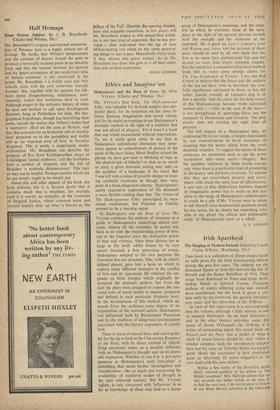Half Homage
Some Graver Subject. By J. B. Broadbent (Chatto and Windus. 30s.) Elaonousrsrr's original and learned interpreta- tion of Paradise Lost is a highly critical act of homage He thinks that Milton's temperament and the currents of history forced the poet to produce a heroically isolated poem in an obsolete kind, and that the tension between his egotism and his 'grave acceptance of the recalcitrant data of human existence' is not reconciled in the poem. Mr. Broadbent is a widely' read and very eclectic critic with his own somewhat staccato manner; this, together with his passion for ink- horn terms (hesperianising, soulishness, ante- cedentia), makes him sometimes hard to read. Although expert in the orthodox history of ideas he does not hesitate to call upon Kierkegaard, Brunner, Jung or Puttenham for help. His bio- graphical hypotheses, though less horrifying than some, include the notion that Milton's father had a 'castrative' effect on the poet at Horton, and that this accounts for an hysterical cult of chastity later projected on to the pamphlets and visible still as 'an impotent envy of love' in Paradise Regained. This is surely a suspiciously elastic explanation. Mr. Broadbent can describe the progress of Eve from Kierkegaardian Angst to Coleridgean 'carnal sophistry,' call the forbidden fruit a symbol of onanism and the fall of Mulciber 'a symbolic &tumescence.' This may or may not be helpful. Perhaps matters which can be put simply ought to be simply put.
About this and other aspects of the book one feels dubious, but it is beyond doubt that it contains much that is excellent, for example (and it is merely an example), in the treatment of Original Justice, where common sense and learned inquiry clear up what is known as `the
fallacy of the Fall': likewise. the opening chapter, keen and arguable exposition. In few places will Mr. Broadbent expect to win unqualified assent; his is not that kind of argument But he has pro- vided d clear indication that the age of easy Milton-baiting (on which he has some penetrat- ing things to say) is past Henceforth critics must, if they choose this grave subject. do as Mr. Broadbent has done and give to it all their atten- tion and all their experience.
FRANK KERMODE






















































 Previous page
Previous page